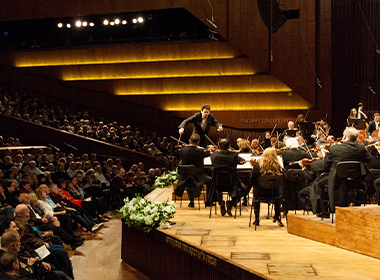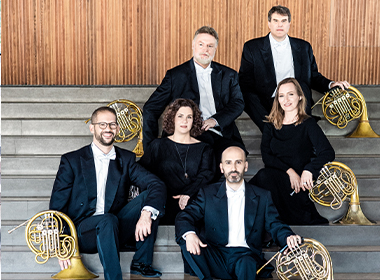Maestro Gianandrea Noseda and violinists Akiko Suwani and Michael Barenboim in two programs featuring two of the most beloved violin concertos of all time – by Bruch and Tchaikovsky. Plus, Rossini‘s Stabat Mater, a surprising piece for within the typical religious genre, in an operatic style characteristic of Rossini.
“In my youth,” wrote composer Max Bruch, “I studied the violin and persisted in my studies for four to five years. Even though I was not a skilled player, I learnt to love the instrument. In my eyes, the violin was the king of instruments and it was quite natural for me to start composing music for this instrument at a young age.” Bruch composed his First Concerto for the instrument he loved so much over a period of eight years. Following its premiere, the concerto returned to the work table to receive its final form – a unique form in which the first movement (contrary to tradition) acts as an introduction, a prelude to the climax in the third movement. The work has a gypsy flavor as in the concertos of Brahms and Tchaikovsky and its dizzy rhythm quickly triumphs on the stage and in the concert hall.
The first steps of Tchaikovsky’s beloved, famous Violin Concerto on the stage of history did not give the slightest hint of the dizzying success the work would later have, justifiably. Tchaikovsky worked on the piece with a violinist friend and sought his technical advice. He presented the work to violinist Leopold Auer who rejected it saying it was both unplayable and unsuited to the instrument. Tchaikovsky then turned to another violinist, Adolf Brodsky, who accepted to play it. The performance received the harshest possible review. After a long period, the world rediscovered the work and since then it has been performed again and again. The concerto swings between a display of virtuosity throughout the work, lyrical statements particularly in the second movement, and a deluge of the senses in the third movement, deluge which must have intimidated Auer and led to the biting criticisms. It’s a good thing these setbacks are far behind us.
The background to the composition of Rossini’s “Staber Mater,” involves a chain of events that will enthrall and amuse lawyers and fans of intricate legal cases. As for the music, that’s another story. The special versification of the liturgical hymn, which describes a mother’s grief as she stands by her dying son, captured hearts across generations and led to numerous versions of the hymn, the most famous of which is Pergolesi’s which Rossini was acquainted with. The work is full of charm and operatic hues, and the music is so moving that cantors adapted it to Jewish texts even though the mother referred to in the text is the mother of Jesus. The work was received with acclaim. French poet Theophile Gautier wrote that: “It possesses nobility, simplicity and seriousness” while German poet Heinrich Heine wrote that it had “eternal grace and irresistible tenderness; it seemed to me like a vestibule to heaven.” The audience here too was left enthralled.
Program No. 1
Gianandrea Noseda, conductor
Akiko Suwanai / Michael Barenboim, violinists
Erika Grimaldi, soprano
Daniela Barcellona, mezzo-soprano
Piero Pretti, tenor
Nicola Ulivieri, Bass
The Prague Philharmonic Choir
Bruch: Violin Concerto No. 1
Rossini: Stabat Mater
Program No. 2
Gianandrea Noseda, conductor
Akiko Suwanai / Michael Barenboim, violinists
Erika Grimaldi, soprano
Daniela Barcellona, mezzo-soprano
Piero Pretti, tenor
Nicola Ulivieri, Bass
The Prague Philharmonic Choir








 Back to top
Back to top




